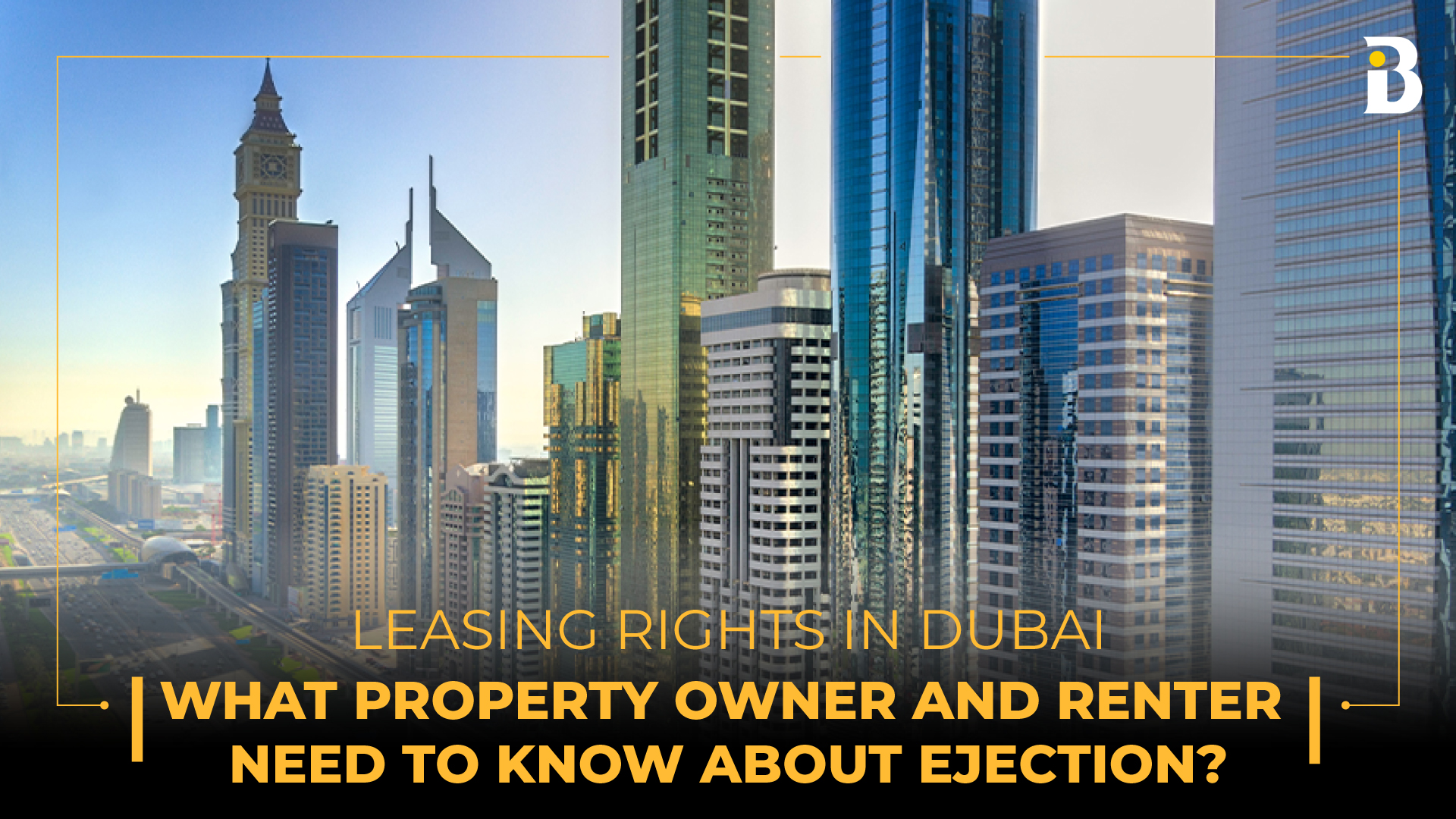Leasing Rights in Dubai: What Property Owner and Renter Need to Know about Ejection?

Dubai is one of the most desired places in the world to purchase property because of its stunning landscape, cosmopolitan atmosphere, and vast investment opportunities. But, for most expats in Dubai, renting is the best option for accommodation for a limited period of time. That’s why leasing an apartment or villa is typically considered a reliable choice when it comes to finding housing in the city.
However, It is essential for both the property owner and Renter to understand Dubai’s leasing laws to ensure no misunderstandings. For example, residents should be aware of their responsibilities regarding eviction procedures in case of a dispute between the tenant and landlord.
What is a lease in Dubai?
A lease in Dubai is a contract between two parties that specifies the rights and obligations of each party involved in the tenancy. In other words, a legal document establishes a tenant’s right to occupy the property temporarily.
As mandated by Dubai’s regulations, the landlord is responsible for furnishing necessary documents such as a properly signed and executed lease agreement, negotiated time period, evidence of ownership, and authorization from the relevant governmental body to receive occupancy.
What are the different types of leases available in the market?
When it comes to leasing residential properties in Dubai, there are four main types of lease agreements available:
Absolute Net Lease
This lease requires the tenant to pay rent and all of the expenses associated with the property, such as taxes, insurance, maintenance costs, etc.
Triple Net Lease
A triple net lease, also known as an NNN Lease, in which the tenant agrees to pay their pro-rata share of all expenses associated with property maintenance, taxes, and insurance, rental rate.
Modified Gross Lease
With this, the landlord will cover property taxes, insurance, and repairs while expenses are shared between the tenant and owner. This agreement allows for more flexibility in budgeting your monthly rent payments.
Full-service Lease
A full-service lease includes the base lease rate and the operating expenses combined into one figure. In it, the landlord covers all expenses associated with the property.
Responsibilities of a property owner when leasing their property?
Being a property owner comes with several responsibilities; one of these responsibilities is when it comes to leasing the property.
Ensures all the rules:
Landlords should ensure that the rental agreement their tenants have to abide by is fair and consistently upheld, including any specific rules regarding the use of the property.
Regular inspection :
It is essential to do regular inspections of the property to ensure compliance with any maintenance codes or regulations.
Liability:
Property owners must also consider liability issues and be aware of their local laws to protect themselves and their tenants.
Privacy:
Property owners must guarantee the security and confidentiality of their tenants, all while ascertaining that safety regulations are obeyed.
Proper knowledge :
Taking on the role of property owner means investing in an understanding and knowledge related to these associated responsibilities to provide a successful tenancy experience for all parties involved.
The Benefits of Leasing for Renters in Dubai
Leasing a property in Dubai brings with it several benefits, such as:
Limited-term Commitment :
When you are still deciding where to establish yourself or what career path to take, renting is a great way to explore your options before committing. Leasing a property in Dubai allows you to have a short-term commitment, as the lease period typically is only 6 – 12 months and does not require more documents.
Ability to negotiate:
Tenants have the power to negotiate rental prices and terms with landlords, affording them a unique advantage in determining their living situation. Even those with limited negotiation skills can take advantage of this by securing more reasonable rates on rent and finding homes at manageable costs.
Flexibility:
Leases offer more flexibility than owning, as you can move quickly in and out of a property without worrying about selling or finding a new buyer. This allows you to find another place to live if your current situation does not suit you.
How to terminate a lease agreement in Dubai?
Terminating a lease agreement in Dubai can be challenging for those unfamiliar with the process. The necessary steps in terminating a lease must be done within the limits of Dubai law, which can seem daunting. To start, tenants should be sure to submit their notice to terminate at least 90 days before they expect to leave to ensure they meet the guidelines of a full termination.
Once that step is complete, renters are advised to have any charges or punitive damages assessed by an approved mediator when possible. Lastly, ensure all utilities have been taken care of, and the property has been returned to its original condition before leaving. Following these steps will result in a successful end for both tenant and landlord when terminating a lease agreement in Dubai.
At Banke, we understand that renting a home can be overwhelming, so we provide our customers with the best advice and resources regarding finding a home, negotiating terms, managing a lease, and terminating agreements. Our customer-centric services are guided by our core values, ensuring that all our customers receive the highest standards when leasing their property in Dubai. Contact us today to learn more about how we can help you with your rental needs!
FREQUENTLY ASKED Questions
Yes, the landlord can sell the property during the lease period in Dubai. However, they must provide proper notice to the tenants before doing so. This notice must include information about any changes that may occur and a timeline for transitioning out of the property.
In Dubai, landlords must provide 90 days of notice when terminating a lease agreement. This applies even if the tenant has signed a fixed-term lease.
Yes, a landlord in Dubai can increase the rent after 1 year. However, they must provide 60 days of notice to the tenant before doing so. The tenant can challenge this increase if they feel it is unjustified.
Yes, a landlord in Dubai can refuse to renew a lease. However, they must provide 30 days of notice to the tenant before doing so. The tenant can challenge this decision if they feel it is being done unfairly.





